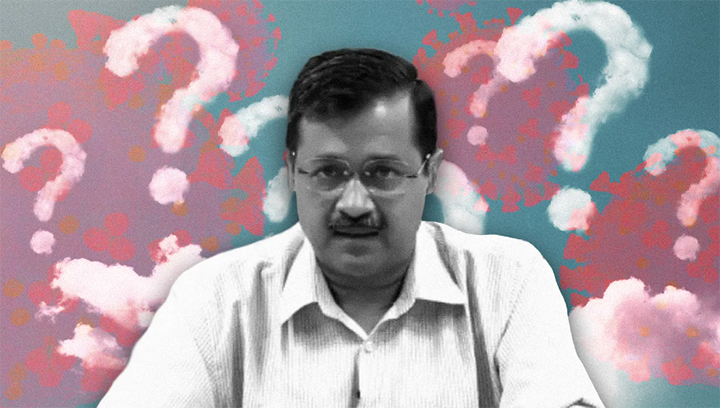
Thankfully, the lieutenant governor has stopped the order from being implemented
The Aam Aadmi Party government had a bizarre brainwave on June 7: they ordered Delhi’s hospitals not to treat Covid-19 patients who couldn’t prove that they resided in the capital city.
According to the order, the hospitals would only treat Covid-19 patients who were bonafide residents of the National Capital Territory of Delhi. How does one prove that they reside in Delhi before getting admitted to a hospital? By showing one of these documents:
Thankfully, before the bizarre order could do any damage, lieutenant governor Anil Baijal intervened and stopped its implementation. But why would the Delhi government bring such an order in the first place? Was it a desperate move, Mr Arvind Kejriwal?As I write, the coronavirus situation in the capital city is this:
Delhi has the most confirmed coronavirus infections and deaths in the country after Maharashtra and Tamil Nadu.
The June 7 directive came soon after the AAP government had changed the testing criteria. An order issued on June 2 stated that “no coronavirus test will be conducted after death” and only symptomatic contacts of other patients would be tested. Currently, Delhi tests the most number of people per million for coronavirus, 11,285 compared to the national average of 3,078.
In this context, the twin orders on testing and treatment came as a double whammy for the people living in the capital.
Delhi is a city of migrants. According to the 2011 census, it has the highest migrant population after Maharashtra. As much as 40 percent of the city’s population – nearly 63 lakh people – is made up of migrants and a large number of them doesn’t have proof of residence.
So, what the AAP government was essentially saying was that it would no longer work for all these people.
The question that comes to mind is: what if a person who doesn’t have a proof of residence gets the virus in Delhi?
The Delhi government specified that the order was restricted to both public and private hospitals within its territory. The state health ministry website shows there are 37 government hospitals in Delhi and 67 registered private hospitals. That’s 104 hospitals which couldn’t treat Covid-19 patients who were unable to furnish proof of residence. They would have to go to any of the 72 hospitals in the city which are run by the central government.
The June 7 order wasn’t thought through, to put it mildly. From the AAP government’s perspective, it is obvious the healthcare system in the city is quickly getting overburdened. Since May 28, Delhi has added more than 1,000 coronavirus cases daily, even as the recovery rate has hovered between 350 and 400 cases a day. This means an excess of 600 cases per day, potentially adding to the burden of the hospitals.
According to a study by the Center for Disease Dynamics, Economics and Policy, Delhi has 39,455 beds across all its government and private hospitals. A piece in Livemint predicts the capital would run out of hospital beds in August if positive cases double every 12 days, as is happening currently. On May 27, Delhi crossed 15,000 infections. Today, 12 days later, it is about to cross the 30,000 mark. If the doubling rate were to be six days, the article adds, then we would run out of beds as soon as mid-June.
There’s really no way to tell if we might have already reached that point given the testing criteria are so stringent that even if someone has the virus, they might not be counted because they are asymptomatic or not severely ill.
This explains the arbitrary decisions being taken by a clearly panicked AAP government. Not just the numbers, anecdotal evidence about the healthcare system being overwhelmed is growing dire by the day. There are reports of patients struggling to find hospital beds and the niece of a former MP dying for want of timely treatment.
All this still doesn’t justify the Delhi government’s orders. It’s ridiculous to ask hospitals to only treat patients who live in that place. It amounts to cutting Delhi off from the rest of India.
What exactly are people who live in Delhi but don’t have proof of residence supposed to do? Go over the border to Gurgaon or Noida for treatment? Or find the nearest hospital which is run by the central government?
On top of this, the Kejriwal government is being accused of obfusticating information. Recently, for one, its Covid app showed beds were available in three private hospitals, but when NDTV checked, all the hospitals said they didn’t have any. This means even “bonafide residents” will face difficulties if they seek treatment.
Instead of rapidly scaling up testing capacity and healthcare infrastructure, gathering and providing reliable information, and finding realistic solutions to the unfolding crisis, the AAP government appears more interested in turning Dil Walon ki Dilli into Residence Proof Walon ki Dilli.
www.newslaundry.com
Youth shot dead by bike-borne attackers while returning from marriage function; police recover cartridges, begin…
Arunachal women allege racial slurs and humiliation by neighbours over repair work dispute; police register…
The magistrate said the probe reveals that multiple associates could be absconding, which could tamper…
The cylinder blast injured six police and fire personnel deployed at the house where a…
Multiple operational teams have been deployed to probe the case. Crime and Forensic Science Laboratory…
The initiative focused on a victim-centric approach and aimed at strengthening public trust through proactive…